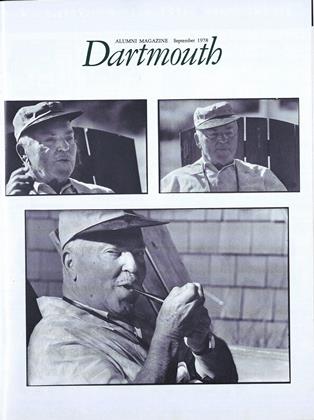It was a while back that education might ideally have consisted of Mark Hopkins on one end of the log and President Garfield on the other, but why in the world does Dartmouth College need a script writer for the Medical School?
A weekly job flyer distributed around the campus gives a clue: To "coordinate the technical development of an inservice videotape training program in normal child development and early childhood/special education for regular preschool personnel." The job, in fact, is part of a community outreach program of a sort that makes the College a good neighbor in the North Country.
It also well and truly demonstrates the variety of job specialties in Dartmouth's job pool. At the beginning of summer, for instance, the College was advertising, in 18 close-writ pages, for no less than 64 persons to take on a like number of administrative or staff jobs. No academic types or buildings and grounds personnel were included. They belong to a whole different set of hierarchies.
In the two categories alone, all sorts of people with all sorts of experience were needed: an assistant dean for administration at Thayer School; an abundance of research assistants, administrative assistants, and programmers - each in styles "A" or "B" or occasionally "senior" - a fair number of differing shades of technician; a good bunch of secretaries. But there were also the script writer, a fluid mechanic technician, a nurse-practitioner. Salaries varied, for the first few entries, from an annual $15,950 to $8,850; for the last 16 pages, more flexibly from an hourly range of $5.44-6.33 to a modest $2.64-2.86.
Beneath that distinction lies something akin to a caste system the College maintains. There are officers, teaching and administrative; there are staff people, primarily in clerical or technical positions; and there are service personnel, mostly unionized. As President Kemeny has defined it, "roughly speaking an officer is one who has line responsibility or serves to represent the institution," and, as he suggested in his Five-Year Report, it is a system that produces some extraordinary anomalies. The bottom of the officer heap pulls a paltry $8,850, compared with a maximum salary verging on $22,000 for a top-grade staff member on a 37½-hour week.
It's more a matter of prestige and "perks" than money. Junior deans struggle along on fancy titles and meager wages, all the while having to pay about three times as much for parking privileges - but they aren't charged fines on overdue books. An officer's fringe benefits as well as salary improve markedly with time. If he or she manages to hang around until a 40th birthday, the College will start contributing 16 per cent of base salary to a retirement fund. Turnover in the lower ranks being what it is, Dartmouth doesn't bother to mess up its books with any retirement system for officers under 30.
Turnovers - known somewhat ghoulishly in the patois of reportese as "terminations" - vary considerably, depending on which rung of which ladder the employee might be on. Slightly over one quarter of all staff and service personnel were "terminated" - presumably non-violently - by retirement, resignation, or what was once called "firing" - during the 1976-77 fiscal year. An overall 8.3 per cent of the administrative corps either retired, were sacked, or found greener pastures elsewhere during that year. (Among the arts and sciences faculty, not counting deaths or retirements, the termination rate was 6.7 per cent - including, 11.2 per cent of assistant professors, the level at which it's generally either up to tenure or out.)
Comings and goings are more frequently in pairs than once they were. Nepotism, once the absolute bugaboo of college campuses, is openly and cheerfully rampant at Dartmouth. Where once the "no spouses need apply" sign was figuratively hung out, employment personnel now make a special effort to help wives or, less often, husbands find appropriate jobs, either at the College or in the community. Not counting 541 union personnel on the roster last year, there were more than 125 couples - or over 13 per cent of the remaining 1,884 employees - on the College payroll. Of these, 34 were at the Medical School.
Predictably, there's a perceptible green tinge among the officers of Dartmouth College. There are about 120 alumni - including a smattering of alumnae - among the faculty and administrative officers. Of the 120, some 80 are in the administration, including all but one of the men who report directly to the President.
At least one fan kept his cool in the heated atmosphere of Celebration Northeast.
 View Full Issue
View Full Issue
More From This Issue
-
 Feature
FeatureA Company of Stretchers
September 1978 By Cay Wieboldt -
 Feature
FeaturePoet at Full Ahead
September 1978 By Charles G. Bolte -
 Feature
FeatureTHE RIVER and THE DAMS
September 1978 -
 Article
ArticleA Journey: Five days to Big Rapids
September 1978 By Dan Nelson -
 Article
ArticleDickey-Lincoln: Who wants it? Who needs it?
September 1978 By Greg Hines -
 Article
Article'A Spirit of Fire and Air'
September 1978 By NARDI REEDER CAMPION








